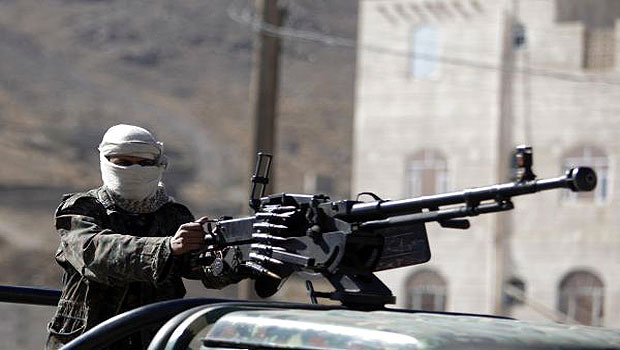
A police trooper holds a machine gun mounted on a police truck as he secures the vicinity around a state security court during the trials of al-Qaeda suspects in Sanaa. (R)
The attack came after Al-Qaeda announced the failure of mediated talks with the government to reach a truce.
Yemen’s Mareb Press news agency reported that 13 people had been killed and 25 injured in a suicide car bomb attack outside the headquarters of the anti-Qaeda Popular Committees in Lawder, Abyan province. The Popular Committees is a civilian-run militia who helped the Yemeni government drive out Al-Qaeda linked militants from the south last year.
Government sources accused Al-Qaeda of being responsible for the bombing, which comes as part of a series of attacks targeting members of the Popular Committees. 40 Popular Committees militia members were killed in an attack last year, including the nephew of militia leader Abdul-Latif Al-Sayed. There have also been numerous attempts on Sayed’s life.
Yemen’s official Saba news agency reported that President Abd Rabbo Mansour Hadi had pledged that “this cowardly terrorist act will not go unpunished” adding that Sana’a will pursue and prosecute the perpetrators to the fullest extent of the law.
The attack took place just hours after the Yemeni government rejected proposals put forward by some religious scholars in the south for a truce with Al-Qaeda. These were the first talks between the Yemeni government and Al-Qaeda in the Arabian Peninsula [AQAP]. The negotiations were mediated by religious scholars and tribal figures, but ultimately ended in failure.
In a statement published online, AQAP claimed that the Yemeni government had initially agreed to a truce following tribal and religious mediations, but had refused to sign the agreement at the last minute.
The statement, which has yet to be verified, said: “Because of what is happening in our country in terms of fighting and bloodshed, and in order to establish security and stability, and after the Yemeni state expressed its willingness and desire [for a truce] . . . this was also met with agreement, desire, and commitment by the Al-Qaeda leadership.”
As for the Yemeni government’s decision not to sign this, the statement stressed that “the Sana’a government’s shameful and obstructive position is based on the projects of America and its agents.”
The statement added that AQAP leader, Nasser Al-Wuhayshi had personally signed the agreement.
A Yemeni official, speaking yesterday, emphasized that President Hadi comprehensively rejects any truce with Al-Qaeda before it lays down its arms.
